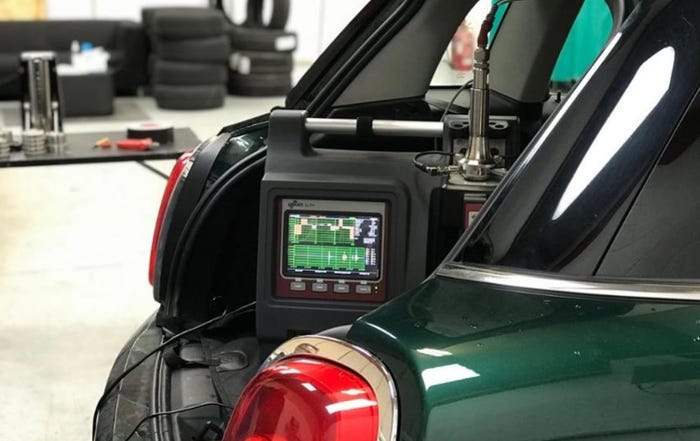More at stake in GM's Dayton strike.
This time, Dayton. Next time, Janesville, WI, or Lordstown, OH, Tor Oklahoma City.If General Motors Corp. is truly committed to overhauling its parts-sourcing strategy, it may have to dig deeper into its $12 billion cash reserves to fight more battles like last month's 18-day stand-off at two Delphi Chassis brake plants in Dayton.These are brutally competitive times. If Robert Bosch Corp. comes along
April 1, 1996

This time, Dayton. Next time, Janesville, WI, or Lordstown, OH, Tor Oklahoma City.
If General Motors Corp. is truly committed to overhauling its parts-sourcing strategy, it may have to dig deeper into its $12 billion cash reserves to fight more battles like last month's 18-day stand-off at two Delphi Chassis brake plants in Dayton.
These are brutally competitive times. If Robert Bosch Corp. comes along with a better antilock brake system at a lower price than Delphi, GM, which remains the high-cost producer of the Big Three automakers, has to buy it or risk falling behind.
If 128 UAW jobs vanish in Dayton only to reappear in a non-union factory in South Carolina, well, that's the way the market works.
Settling the Dayton strike will take an estimated $200 million out of first-quarter earnings as GM and Delphi will develop a new generation of antilock brakes, build them in Dayton, hire 275 workers immediately and add 117 skilled trades apprentices over two years.
Some of those jobs were coming anyway because Delphi still makes 90% of Gm's brakes in North America and supplies Chrysler Corp. and Isuzu Motors Ltd. The two brake plants remain very profitable.
But Bosch is more competitive than Delphi in certain ABS products, not only because it pays lower wages, but because it has invested more in new technology.
As technology advances and isolated parts evolve into larger complex systems, Delphi will find more of its 167 product lines under assault from leaner competitors who are ahead on the technology curve.
Despite some media portrayals of the UAW as a band of featherbedding Trotskyites, most Delphi workers are very concerned about cutting costs and winning new business. Many have worked seven days a week for more than a year.
After a similar skirmish two years ago at the same Dayton brake plants, Delphi and UAW officials set some goals. Many of the production lines were running less than 50% of the time the plant was open. The target: get the "up time" to 80%.
"We have gone to great lengths to improve and we will continue to do more," says Dan Brockman, UAW Local 696's Quality Network representative.
But management made what the union believed were commitments to invest in new technology. Only a fraction of that technology has materialized. Consequently, productivity has improved, but not enough to achieve the 80% goal.
"They just want to talk about how we've fallen short, but if you don't have a capable process and technology there's only so much a guy on the floor can do," Mr. Brockman says.
Even management supporters like the University of Michigan's David E. Cole points out that competitiveness encompasses much more than what you pay workers. "You can't put the entire burden of improvement on the plant," Mr. Cole says. "You've got to focus on the design of the product because that's where the cost is determined."
In the rapidly changing antilock brake game, Delphi is slipping behind Bosch, ITT Teves and Kelsey-Hayes in terms of market share. J.T. Battenberg III, president of DelphiAutomotive Systems, has said he believes in General Electric Co. Chairman Jack Welch's philosophy: If you are not first or second in the market for a given product, you should get out of the business.
But so far Mr. Battenberg is unable to close 14 parts plants that are losing money.
The good news: Where it is lean, Delphi is attracting $100 million in new business each month from non-GM customers.
The UAW wants to build on that, too. Local 696 in Dayton ordered 300 members to cross picket lines to make brake parts for Chrysler Corp. and Isuzu Motors Ltd.
The workers in Dayton aren't fighting so much for their own jobs as they are for the next generation. They want to preserve their UAW pay and benefits, and the standard of living that goes with it.
It's a noble cause, but one they have a slim chance of winning.
While today the Dayton workers are competing with a non-union plant in South Carolina, those Bosch or ITT Teves workers someday soon will face a similar showdown with another plant, perhaps in Mexico or India or China.
That's where global competition is ultimately leading.
"GM eventually wants to be like Nike," says Sean P. McAlinden, labor economist at the University of Michigan's Office for the Study of Automotive Transportation. "You design the shoe in Oregon and push a button and it's made in Indonesia."
You May Also Like



